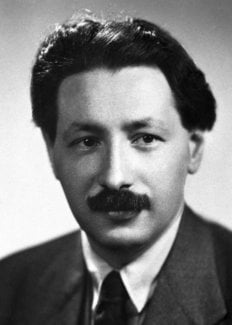Ernst B. Chain
Biographical

Ernst Boris Chain was born on June 19, 1906, in Berlin, his father, Dr. Michael Chain, being a chemist and industrialist. He was educated at the Luisengymnasium, Berlin, where he soon became interested in chemistry, stimulated by visits to his father’s laboratory and factory. He next attended the Friedrich-Wilhelm University, Berlin, where he graduated in chemistry in 1930. He was from an early age interested in biochemistry and after graduation he worked for three years at the Charité Hospital, Berlin, on enzyme research. In 1933, after the access to power of the Nazi regime in Germany, he emigrated to England. Here, his first two years were spent working on phospholipids at the School of Biochemistry, Cambridge, under the direction of Sir Frederick Gowland Hopkins, for whose personality and scientific ability he came to have a great admiration.
In 1935 he was invited to Oxford University where he worked in the Sir William Dunn School of Pathology, becoming, in 1936, demonstrator and lecturer in chemical pathology. In 1948 he was appointed Scientific Director of the International Research Centre for Chemical Microbiology at the Istituto Superiore di Sanità, Rome. He became Professor of Biochemistry at Imperial College, University of London, in 1961, which position he still holds.
His research has covered a wide range of topics in addition to those already detailed. From 1935 to 1939 he worked on snake venoms, tumour metabolism, the mechanism of lysozyme action and the invention and development of methods for biochemical microanalysis. In 1939 he began, with H. W. (now Sir Howard) Florey, a systematic study of antibacterial substances produced by micro-organisms. This led to his best known work, the reinvestigation of penicillin, which had been described by Sir Alexander Fleming nine years earlier, and to the discovery of its chemotherapeutic action. Later he worked on the isolation and elucidation of the chemical structure of penicillin and other natural antibiotics. Since 1948 his research topics have included carbohydrate-amino acid relationship in nervous tissue, a study of the mode of action of insulin, fermentation technology, 6-aminopenicillanic acid and penicillinase-stable penicillins, lysergic acid production in submerged culture, and the isolation of new fungal metabolites.
Professor Chain is author or co-author of many scientific papers and contributor to important monographs on penicillin and antibiotics. He was in 1946 awarded the Silver Berzelius Medal of the Swedish Medical Society, the Pasteur Medal of the Institut Pasteur and of the Societé de Chimie Biologique, and a prize from the Harmsworth Memorial Fund. In 1954 he was awarded the Paul Ehrlich Centenary Prize; in 1957 the Gold Medal for Therapeutics of the Worshipful Society of Apothecaries of London; and in 1962 the Marotta Medal of the Società Chimica Italiana. He was elected a Fellow of the Royal Society in 1949. He holds honorary degrees of the Universities of Liège, Bordeaux, Turin, Paris, La Plata, Cordoba, Brasil, and Montevideo, and is a member or fellow of many learned societies in several countries: these include the Societé Philomatique, Paris; the New York Academy of Medicine; the Accademia dei Lincei and the Accademia dei XL, Rome; the Académie de Médicine, Académie des Sciences, Paris; the Real Academia de Ciencias, Madrid; the Weizmann Institute of Science, Rehovoth, Israel; the National Institute of Sciences, India; the Società Chimica Italiana; and the Finnish Biochemical Society.
He is a Commander of the Légion d’Honneur and Grande Ufficiale al Merito della Repubblica Italiana.
Professor Chain married Dr. Anne Beloff in 1948. They have two sons, Benjamin and Daniel, and one daughter, Judith. Music is one of his recreations.
This autobiography/biography was written at the time of the award and first published in the book series Les Prix Nobel. It was later edited and republished in Nobel Lectures. To cite this document, always state the source as shown above.
Ernst B. Chain died on August 12, 1979.
Nobel Prizes and laureates
Six prizes were awarded for achievements that have conferred the greatest benefit to humankind. The 14 laureates' work and discoveries range from quantum tunnelling to promoting democratic rights.
See them all presented here.
